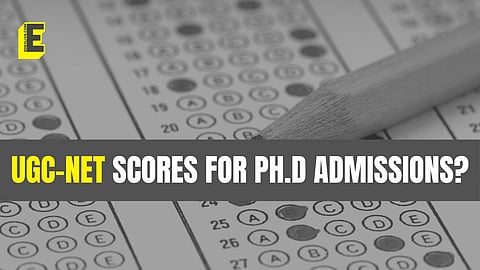

The decision by the University Grant Commission (UGC) to use the National Eligibility Test (NET) scores for PhD admissions from 2024-25, thus, eliminating the need for separate entrance tests conducted by universities and higher education institutions, has attracted flak from the academic circles.
Why? Among several other reasons, academicians believe that UGC-NET, which is effectively an objective-type exam, falls short in identifying the candidate’s true potential for research.
In an editorial by Amit Mitra Research Associate at the National Council of Applied Economic Research (NCAER), New Delhi, published exclusively in The Hindu, a few such shortcomings of the centralised UGC-NET exam were succinctly listed.
Format: The editorial argued that research demands engagement with complex ideas, the capability to critique established knowledge, and originality. But UGC-NET, in its current format, is not capable of testing these skills. Especially when it comes to certain subjects like humanities. The multiple-choice question (MCQ) format which stresses factual recall "trivializes" subject matter, The Hindu editorial stated.
Effect on marginalised students: The editorial further explained that the consequences of a centralised exam like UGC-NET are especially significant for students from marginalised communities. This is because they don't have the access to necessary material or coaching classes to excel in these exams.
Narrowing diversity: “Research thrives on diversity of thought, methodology, and perspective. By funnelling all PhD aspirants through a standardised test that values rote memorisation over critical thinking, we risk cultivating a generation of scholars more adept at passing examinations than at pushing the boundaries of knowledge,” opined Mitra and added that the real challenge lies in developing a system that "recognises and nurtures the full range of talents required for ground-breaking research".
Does not prepare students: PhD comes with responsibilities like original contributions, publishing papers in peer-reviewed journals and engaging in discourse, the exam doesn't prepare the student for these competencies.
Reducing autonomy of research institutes: Higher Educational Institutes (HEIs) in India traditionally played a pivotal role in selecting candidates based on unique criteria such as research proposals, interviews, and discipline-specific tests. But now, this “one-size-fits-all” approach undermines the diversity and innovation that are essential to academic research, added Mitra via The Hindu editorial.
